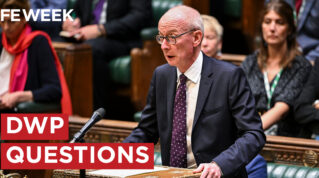It is conventional to think three things about machinery of government changes.
Firstly, that they represent seismic shifts because they bring in at least some new ministers and facilitate new policy linkages that were harder to make cross-Whitehall. Secondly, and contradictorily, that they are superficial, because the same civil servants remain in post and anyone who has watched Yes, Minister knows where the real power lies. And thirdly, that they cause disruption. Even if the officials stay the same, they are busy navigating new intranet homepages, attending departmental values workshops and figuring out where their new desk is.
All these things will be at play this time to some extent. The art lies in working out whether this is a desk-shuffling change or a more fundamental one.
One way to do that is to look at a fourth, under-appreciated aspect: the difference in culture between departments. They are not all operating in the same way.
They all have different policymaking instincts, analytical heuristics and delivery experiences which subtly but meaningfully shape a policy area; the spirit that makes a department what it is. Over time that can have more influence than individual ministers or officials.
So, what does the Department for Work and Pensions (DWP) policy culture mean for adult skills?
We’ve seen (some of) this movie before
Skills policy has long been nomadic, passed between departments, from education to business, science and innovation, and now employment. Each change brought a subtle shift in policy approach.
For example, post-Richard apprenticeship reforms were conceived in the Department for Business, Innovation and Skills (BIS), in an employer-focused environment, but then delivered by the Department for Education (DfE), where instincts were for more traditionally regulated education programmes. Over time, this cultural mismatch led to a drift away from Doug Richard’s original reforms, for example in recent changes to assessment.
Will it be the same this time round?
“Yes, but…” Yes, there will be some small but perceptible shifts, informed by the DWP way of thinking:
- The DWP will be used to thinking at a system or individual level – the overall labour market or the individual jobseeker – but less comfortable at the level of the institution (college, provider, awarding organisation).
- It will be used to a system where delivery sits with civil servants all the way down to the jobcentre adviser or is outsourced through significant welfare-to-work schemes, rather than a front line of tutors and assessors they do not employ.
- It will have a different approach to arm’s length bodies. How will the DWP understand Skills England and its cross-Whitehall remit; and how will it manage what will be the department’s only executive agency?
But… there is also a macro-change in how the government thinks about skills here. It is obvious that a shift to the DWP means increased focus on employment and growth; and a strengthening of the link between skills and jobs.
That is healthy and positive. But anyone who has spent time working on skills policy this millennium will have spent time debating with the DWP over whether people just need to get a job, any job; or whether it is beneficial to provide training so they can get, stay and progress in a better job.
Played out between departments, that debate never really comes to a head: government interventions continue to deliver a little from column A, a little from column B. But that policy contest is likely now to resolve in favour of a jobs-first approach.
Does that mean more shorter, work-focused training? What does it mean for foundation apprenticeships? Will the welfare-to-work juggernauts consume everything in their path?
That is the significant change here. This shift in ethos will transcend ministerial churn and civil service personnel and probably mean more in delivery terms than a recalibrating of what employers “being in the driving seat” of apprenticeship reform means.
None of these changes will happen overnight. Officials need time to adjust, not just to new desks, but to a new policymaking and delivery culture. And over time that culture will change skills policy in lots of small ways, as it has at previous transition points.
But I think this could go bigger than that. By rehousing adult skills and employment in the same department, this could be one of the most consequential and interesting changes in the machinery of government since 1997.
















Your thoughts